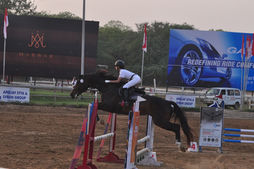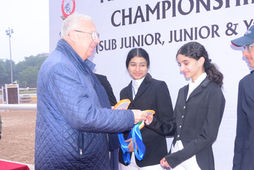Breaking Stereotypes: Men and Women in Modern Equestrianism
The arena fell silent except for the rhythmic rattle of hooves and applause.
At thirteen, I sat atop Crispin 14 at the FEI Children's Classic Bronze Tour in Jaipur, my heart synchronized with my horse's powerful stride. At that moment, height mattered more than gender. Skill trumped stereotypes.
The jump ahead demanded precision, not masculinity or femininity - just pure partnership between two beings moving as one. I remember scanning the competition lineup that September day in 2022.
Nobody questioned whether I belonged there because of my gender. What mattered was whether I could guide Crispin through those ‘leaps of finesse’ with grit and determination. That day, we claimed first place in India and tenth globally. Not because I was a girl who rode well, but because we were a team that performed exceptionally.
The Magnanimity of Equestrianism
When you're in the saddle, your horse doesn't care about social constructs or biological differences. Horses respond to confidence exuded by skilled tugs and thrusts, consistency of nurture and nourishment, and the connection established with the equestrian’s emotional intelligence. They feel your energy, read your intentions, and mirror your emotions.
My equine partners have taught me that courage isn't gendered. Neither is dedication. When I was working with Verdinand in dressage, the partnership only demanded empathy, timing, and trust. These universal qualities transcend any social boundaries and gender stereotypes. During team events at the Nationals, I've ridden alongside male competitors who became teammates, not rivals defined by gender. We shared the same goals, faced the same challenges, and celebrated victories together.
From Side-saddle to Olympic Glory
Equestrianism has evolved stunningly over the centuries. Where once women were restricted to side-saddle riding in long skirts, today we compete in every discipline imaginable. The sport naturally embraced equality because horses never recognized the artificial barriers humans created. Olympic equestrian events became some of the first to feature mixed-gender competition, not through activism, but through the simple recognition that skill matters most.
This progression happened organically because the sport demands it. In dressage, success comes from subtle communication and artistic expression. In show jumping, it requires split-second decision-making and athletic ability. In eventing, it demands versatility across multiple disciplines. None of these skills are inherently masculine or feminine. They're human qualities refined through dedication and practice.
Everything Changes in the Arena
Today's equestrian competitions showcase this natural equality. At FEI events, male and female riders compete on equal footing, judged by identical standards. The World Dressage Challenge where I represented India in both 2023 and 2024 exemplifies this perfectly. This creates an environment where excellence flourishes because the best riders, regardless of gender, push each other to greater heights.
The intellectual aspects of equestrianism also reveal why gender becomes irrelevant at the highest levels. Psychological resilience, the ability to stay calm under pressure, and the emotional intelligence to connect with a 1,200-pound animal are the true differentiators.
Charisma over Chromosomes
What draws me most to this sport is how it strips away pretences. In the arena, you can't fake confidence or hide fear. Your horse knows. The jumps don't lower for anyone. The dressage movements don't become easier based on who's performing them. This authenticity creates a space where riders are judged purely on merit, where partnerships between horse and rider transcend societal expectations.
Equestrianism continues to inspire me because it proves that when we focus on skill, dedication, and genuine partnership, traditionally imposed social stigmas don’t matter. Every time I enter an arena, I'm not just representing myself as a female rider. I'm representing the timeless truth that champions are forged through passion, perseverance, and the magical connection between human and horse.
Champions are defined by their accomplishments, and not by the differences in their chromosomes.










































.png)
.png)
.png)
.png)
.png)
.png)
























